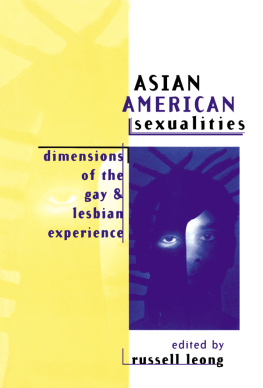ROUTLEDGE LIBRARY EDITIONS:
LITERATURE AND SEXUALITY
Volume 3
LESBIAN VOICES FROM
LATIN AMERICA
LESBIAN VOICES FROM LATIN AMERICA
ELENA M. MARTNEZ
First published in 1996 by Garland Publishing, Inc.
This edition first published in 2017
by Routledge
2 Park Square, Milton Park, Abingdon, Oxon OX14 4RN
and by Routledge
711 Third Avenue, New York, NY 10017
Routledge is an imprint of the Taylor & Francis Group, an informa business
1996 Elena M. Martnez
All rights reserved. No part of this book may be reprinted or reproduced or utilised in any form or by any electronic, mechanical, or other means, now known or hereafter invented, including photocopying and recording, or in any information storage or retrieval system, without permission in writing from the publishers.
Trademark notice: Product or corporate names may be trademarks or registered trademarks, and are used only for identification and explanation without intent to infringe.
British Library Cataloguing in Publication Data
A catalogue record for this book is available from the British Library.
ISBN: 978-0-415-78487-0 (Set)
ISBN: 978-1-315-21275-3 (Set) (ebk)
ISBN: 978-0-415-79042-0 (Volume 3) (hbk)
ISBN: 978-1-315-21320-0 (Volume 3) (ebk)
Publishers Note
The publisher has gone to great lengths to ensure the quality of this reprint but points out that some imperfections in the original copies may be apparent.
Disclaimer
The publisher has made every effort to trace copyright holders and would welcome correspondence from those they have been unable to trace.
LESBIAN VOICES FROM LATIN AMERICA
ELENA M. MARTNEZ
GARLAND PUBLISHING, INC.
NEW YORK AND LONDON
1996
Copyright 1996 Elena M. Martnez
Library of Congress Cataloging-in-Publication Data
Martnez, Elena M., 1956
Lesbian voices from Latin America : breaking ground / Elena M. Martnez.
p. cm. (Latin American studies ; v. 7) (Garland reference library of social science ; v. 907.)
Includes bibliographical references and index.
ISBN 0-8153-1349-7 (alk. paper)
1. Spanish American literatureWomen authorsHistory and criticism. 2. Lesbians writings, Spanish AmericanHistory and criticism.
3. Spanish American literature20th centuryHistory and criticism.
I. Title. II. Series: Garland reference library of social science. Latin American studies ; vol. 7. III. Series: Garland reference library of social science ; vol. 907.
PQ7081.M3617 1996 860.9928708664dc20 95-37411
CIP
Cover illustration by Kathy Buist.
Printed on acid-free, 250-year-life paper
Manufactured in the United States of America
For K. B.
with love and appreciation
In memory of
NANCY CRDENAS
(19341994)
It is our fiction that validates us.
Monique Wittig
CONTENTS
FOREWORD
The idea to write this book began burgeoning in 1988, when upon finishing my doctoral dissertation at New York University on the narrative works of the Uruguayan writer Juan Carlos Onetti, I read enthusiastically En breve crcel (Certificate of Absence), the first Spanish American novel with a lesbian theme, written by the Argentinean literary critic Sylvia Molloy. I was so impressed by Molloys work that I wrote an essay (En breve crcel: la escritura/lectura del (de lo) otro en los textos de Onetti y Molloy) on the themes of the other, otherness and voyeurism in En breve crcel and in two works by Onetti, Bienvenido, Bob and La novia robada. However, like other critics who have studied Molloys novel, I did not address its lesbianism in my essay.
In 1989, my attention turned to the works of a Cuban writer living in Sweden, Ren Vzquez Daz, who is the author of La era imaginaria, Querido traidor, La precocidad de los tiempos, Trovador americano, Tambor de medianoche and Donde se pudre la belleza. His novel La era imaginaria attracted my interest because of its polyphonic texture as well as its articulation of four major discourses: the literary, the feminist, the humorous and the sexual. The articulation of feminist and sexual discourses interested me in particular because of the authors ability to present and develop a wide range of conflicting possibilities and ideas that contest Western cultural traditions. La era imaginaria gives voice to a broader representation of women and gay men, thus creating a more inclusive discourse than other Latin American literary works.
My interest in Molloys Certificate of Absence and Vzquez Dazs La era imaginaria stems from my commitment to the study of literature that presents womens issues and homosexual themes. In 1991, after being appointed Assistant Professor at Baruch College (City University of New York), I participated in a series of workshops on Multiculturalism and Pluralism organized by Profs. Paula Berggren and George Otte of the English Department at Baruch. At that time, I was asked to give a talk on Latin American writers whose works present a different perspective from the mainstream Latin American literary canon. As part of those workshops on Multiculturalism and Pluralism, I included the study of Latin American works that present gay and lesbian themes, such as the works of the Cuban gay writer Reinaldo Arenas and Sylvia Molloys Certificate of Absence. During those workshops in 1991 at Baruch College, I became more aware of the importance of studying lesbian and gay voices in Latin American literature. Hence, this book grew out of a movement toward raising awareness of pluralistic views on literature and diversity in society.
* * *
PREFACE
In spite of the attention that Latin American women writers have attracted over the last two decades, a book dedicated exclusively to those writers whose work primarily articulates a lesbian perspective is still missing.
The purpose of Lesbian Voices from Latin America: Breaking Ground is to bring attention to and examine the articulation of lesbian themes, motifs and issues in the works of Magaly Alabau, Nancy Crdenas, Sylvia Molloy, Rosamara Roffiel and Luz Mara Umpierre. It aims to study the problems pertaining to the specific literary representations of lesbianism and to examine the dimensions of a lesbian view in the works of these authors. This study underscores my belief that Latin American lesbian writing merits an independent investigation. By undertaking the study of the works of these women writers, this book contributes to the recognition and legitimization of a lesbian literary discourse.
Magaly Alabau (1945-) is a Cuban poet living in New York City who left her country after the outbreak of the Cuban revolution. She has published Electra/Clitemnestra (Electra/Clytemnestra; 1986), La extremauncin diaria (The Daily Extreme Unction; 1986), Ras (Edge; 1987), Hermana (Sister; 1989), Hemos llegado a Ilin (Ilium; 1991) and Liebe (1993). Her poetry has appeared in Spanish in various journals. Nancy Crdenas (19341994), Mexican poet, playwright, and theater director, was, until her death in April 1994, an activist for womens and particularly lesbians rights. Her book Cuaderno de amor y desamor







